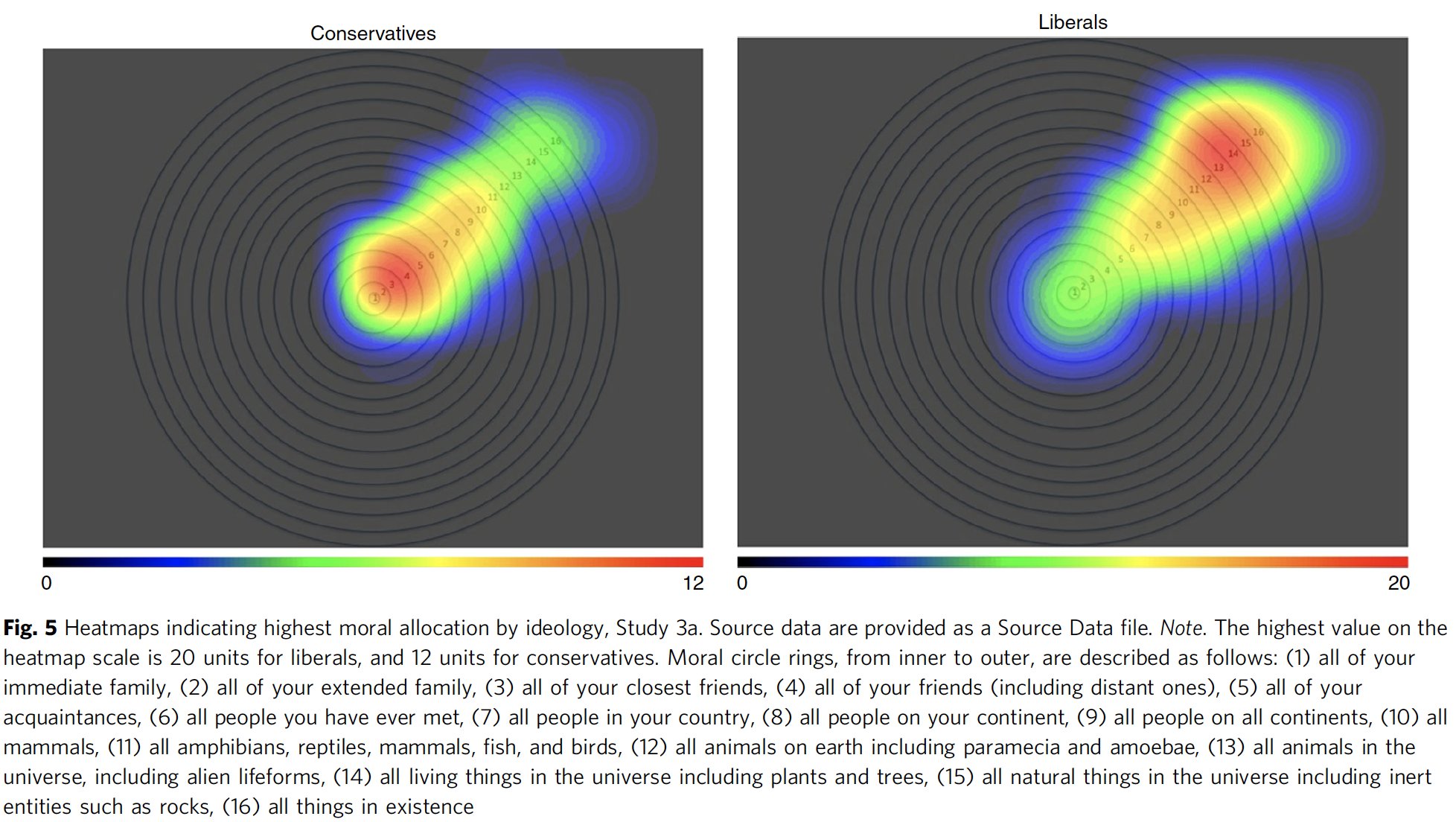The Human Codex
Politics is exhausting. Say the wrong things to the wrong people, and you're suddenly on a witch hunt -- as the witch. You're also expected to know everything about everything. So, I've distilled some key ideas below which can take you pretty far in navigating discussions around psychology, society, and politics.
Empathy Divide

Figure 1: Heatmap of Empathy
There is a big observable difference between people who identify as conservatives and liberals on how much they care about people and things around them. The above figure does a great job at explaining the difference between the two.
The key takeaway is how comparatively, conservatives do not assign as much moral value to people outside their acquaintances (ring 5) while most liberals assign at least some (if you have time, read the full study, it's very interesting). I also believe this indirectly shows how each of us has a finite amount of total empathy, and that in general the more we direct our empathy to abstract further-away entities, the less we have for real entities close to us, and vice versa.
Individuals Seek Belonging
Humans inherently strive to be a member of a group. Evolutionarily speaking, you could not survive without being part of a group. Humans hunted in groups, babies were raised in groups, and so on. While modern luxuries have made group membership not strictly necessary, we are still biologically hardwired as social creatures.
This desire to belong is why we are so eager to latch onto a group identity. Whether this is with our family, friend groups, nationalities, ethnicities, religions,or political parties, we are hardwired to find a group, a label, to belong to. I believe any group can be categorized into one of two types: birthright or ideological. Birthright groups are those that are given to you by birth, such as your family, nationality, and ethnicity. Ideological groups are those based more on beliefs, such as political parties, religions, and so on.
With the rise of globalism and Internet use, birthright identities have become less meaningful. For example, in mixed race families, it is hard to wholly latch onto a nationality or ethnicity. Moreover, it's not guaranteed that you will internally identify with your nationality or ethnicity. For example, someone born outside of America could potentially feel a stronger sense of belonging to American culture than to their own ethnic motherland(s).
Unlike groups given by birthright, ideological groups are more fluid -- hence easier to "join", but also reflective of your own tastes. I believe this freedom of choice is why today, many people care more about "what you believe" rather than "what you are". It's a more deeper reflection of who you are as an individual.
A lot of our beliefs are also a result of mimicry. We mimic the beliefs of the group we are a part of. This is a defense mechanism against the out-group.
The Normal Distribution
Also known as the Gaussian or the bell curve, this probability distribution is the most common one observed in nature (the reason behind this is because of the central limit theorem, but that is not within the focus of this blog).

Figure 2: Normal Distribution
What you should take away from this is that when discussing or understanding anything, you must remain cognizant that most conversations revolve around the distribution, not the individual data points. I see so many examples of people focused on outliers rather than the distribution. For example:
Claim (on distribution): "Pitbulls are dangerous"
Rebuttal (individual data points): "But my pitbull is friendly!"
This rebuttal doesn't refute the shape of the distribution in any way. It only shows that there are exceptions to the rule.
Also, observe how small the tail ends of the distribution are. It requires 2 standard deviations away from the mean to be considered an outlier in the top/bottom 3%. This means that most people are not outliers. Let me say that again. Most people are not outliers. Not everybody can become a top tier athlete, renowned musician, grandmaster chess player, or movie star.
Here's where it gets interesting. Mathematically speaking, the tails of the distribution are incredibly sensitive to changes in the mean and standard deviation. Feel free to explore the math on your own, but I want to illustrate its implications in the next section.
Understanding the normal distribution is key to understanding the world.
Self Perception
If you're ugly, obese, and/or ungroomed, every day when you look in the mirror, you see a reminder of your inadequacy. This negative self image can easily breed resentment and anger within you. It's bound to affect your thoughts. Your self-perception is behind every action you take, every word you say, and every decision you make.
When someone has an opinion on something, their self-perception is reflected in their opinion. The aesthetic divide between the ugly and beautiful is reflected in many things in the world. Keep this in mind when engaging with others.
The most judgemental are usually the most insecure. Success reminds ugly people of their inadequacy.
Hope this helps you understand the world a bit better.